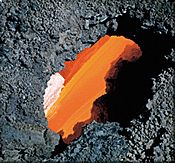Ideas: The Research Agenda
THE SCIENTIFIC AGENDA
![]()
 The
scientific agenda of the geosciences is based on a solid intellectual
framework which includes:
The
scientific agenda of the geosciences is based on a solid intellectual
framework which includes:
- Recognition that understanding the complex interaction among Earth system components is at the frontier of the key geoscience questions;
- A greatly enhanced understanding of the various Earth system components largely achieved through disciplinary basic research;
- Great advances in the capability of observing systems, computers, and information processing;
- Understanding the historical variation in the Earth system components and their interactions to test our models and to provide examples of states of the system that might reoccur in the future;
- Recognition that fundamental knowledge of our Earth system has assumed critical importance since humans are now capable of influencing processes on a planetary scale as well as being significantly impacted by planetary variations.
Building on this framework, the NSF geosciences agenda focuses on enhancing our base of knowledge in these fundamental areas:
RESEARCH AGENDA GOALS
![]()
 Planetary
Structure
Planetary
Structure
To describe the
spatial and temporal variations of the structure and composition of all
Earth system components, from the inner core to the upper atmosphere,
through improvements in observational, theoretical and modeling capabilities.
Planetary Energetics and Dynamics
To understand the
links between physical and chemical processes by focusing on the exchange
of energy within and among the components of the Sun-Earth systems.
Planetary Ecology
To understand the
Earth's marine and terrestrial ecosystems and their evolution, and the
interaction of the biosphere with Earth system processes. The ecology
of Earth is proving more diverse and complex than ever expected with life
forms being found even deep in the Earth's crust and under the most extreme
conditions on the surface of the planet.
Planetary Metabolism
To understand the
links and feedbacks among the Earth's physical, chemical, geological,
biological, and social systems, how they have evolved, and how they affect
the biocomplexity in the environment of the planet.
KNOWLEDGE BASE
![]()
Traditionally, the
components of our planetary system have been studied from the perspective
of the established disciplines of atmospheric sciences, ocean sciences,
and solid Earth sciences. Through decades of observational and theoretical
work, we have developed a fairly detailed understanding of the basic planetary
structure that now leads us to new frontiers in the integration of these
sciences. Knowledge of the physical and chemical structure of the Earth's
components has given us important clues, leading to an ever greater understanding
of the planet's past and its evolution to the present and into the future.
In the subsequent section, Planetary Energetics and Dynamics, we focus
on cutting across the increasingly artificial disciplinary divisions to
develop new integrated information systems and models that can describe
the complex interactions among the physical components of the Earth system.
Ecology at the planetary scale contributes a unique perspective to Earth
science. Its underlying paradigm emphasizes the diversity of biomes, resulting
from evolutionary history and the complex ways in which changes in the
planet's environment can affect and be affected by biological systems.
A new thrust in the 21st Century will be the recognition that Earth's
past history and future course cannot be understood without an explicit
integration of the effects of its biological activity, including that
of humans. Planetary Metabolism provides an integrative approach to this
complex issue.


